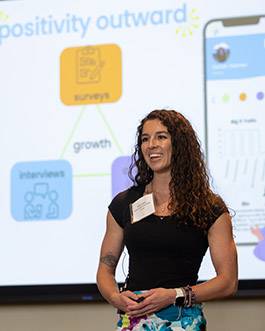Profile: Zariah Tolman '22

We would like you to meet Zariah Tolman ’23, a graduate of the Master of Science in Innovation and Management (MSIM) program from Otto, Wyoming. She earned her bachelor's degree in cell biology and neuroscience and biochemistry from MSU.
She is the Founder and Executive Director of Positivity Outward and is a 2nd year Ph.D. student at the University of California, Riverside.
Positivity Outward aims to provide rural youth the mentorship they need to thrive. There is an opportunity to connect as a mentor or mentee. With support from grants, there is currently no cost for participants.
How did you hear about the MSIM program?
After my MSU undergrad, I took a gap year to begin building Positivity Outward (PO). During the gap year, I realized the value of a business education and looked at several programs. I was recommended to apply to the program by Trevor Huffmaster, a mentor of mine who works in the Blackstone Launchpad at MSU. The Launchpad was an incredible resource for me as an entrepreneur, so Trevor’s praise of the program held a lot of weight in my decision. The MSIM is unique because it is a one-year master’s geared towards students with science backgrounds. The networking opportunities and self-development that happens through the program were motivating to me as well.
What are some things that stood out about the MSIM program?
I can count on one hand the number of positive group project experiences I had in my undergrad. Most of the MSIM program is group and teamwork, and I was surprised at how much I learned about working with others and how many of those group projects were positive experiences. You learn how to be part of a team and see how everyone benefits when you put your best attitude and work forward. Teaching those soft skills is an incredible feat that I give the faculty professors and in particular Ara, the program director, credit for. I haven’t stayed in touch with many people from my undergrad, but I keep close contact with several people from the MSIM program, including professors and students. Almost a quarter of our MSIM cohort volunteer as mentors for Positivity Outward, and I am honored to have their experiences and expertise benefiting the students we work with.
How did your non-profit benefit from your MSIM education?
Positivity Outward became “real” during the MSIM program. I worked almost full-time on PO during my gap year, but the progress was slow and I often struggled to know what to do. With what I learned in my MSIM courses, an actual strategy and plan for Positivity Outward developed and I took meaningful action towards those goals. At the start of the MSIM, we didn’t even have the requirements for training our mentors finalized. By the end, we had over 35 mentors trained and on the app and were actively recruiting student mentees from several partner schools.
I learned from and was advised by some of the most incredible and successful entrepreneurs in Bozeman.
The MSIM program teaches you frameworks and tools that can be iteratively applied to a variety of contexts. Being an entrepreneur is not easy, but the support in the MSIM program helped me to lean into my resilience and grit to not give up on something I am so passionate about.
What are 1-3 things that you took away from your time in the MSIM program?
1. Networking: one of the professors in the program has continued to support me and Positivity Outward by providing financial support and incredible personal and professional advice. I come from a low-income and blue collar background, so I didn’t interact with business professionals before the MSIM. Very successful people are still people, and learning how to interact with and learn from them was something I learned during the MSIM.
2. Applied data science: My Excel skills skyrocketed because of Sean’s class. I use Excel now for a variety of personal (like budgeting and tracking) and professional uses (most of my research data happens in Excel). I think every professional needs to feel comfortable with spreadsheets and the best way would be with Sean [Harris] in the MSIM.
3. Systems thinking: I now think in systems and flow. I’m constantly asking myself these types of questions: Where is the information? Who does it need to get to? How can I make this process more efficient and make sure that if something is lost, I know about it? How do I make sure my team and I are on the same page about the project and more importantly, what did we all learn when something goes wrong?
Life is a series of iterations and adjustments, and learning to think in systems and adding in constant reflection and review was something I learned during the MSIM.
What advice would you give a student considering the MSIM program?
I use what I learned in the MSIM program every day as a PhD student and I am confident that I will continue to use those skills and knowledge in every job I take after graduation. The MSIM is an incredible 1-year opportunity that will prepare you to be a better professional.
You will get out of the program what you put in, so if you are willing to put your full self into this short program, it will absolutely change your life.
If you aren’t sure about the timing, I also highly recommend taking a gap year. I found immense clarity in that time about what I wanted to do, so don’t hesitate to take a year or two between undergrad and the MSIM. That time will only help you get more out of the MSIM.

